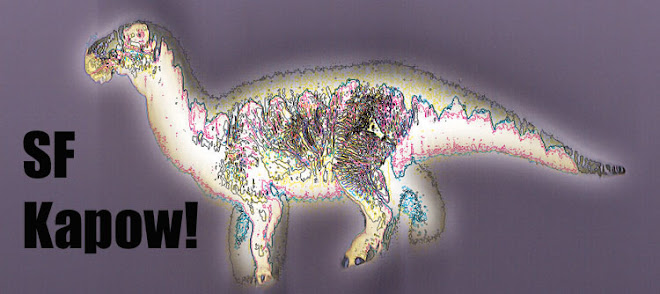Riley: Buffy. When I saw you stop the world from, you know, ending, I just assumed that was a big week for you. It turns out I suddenly find myself needing to know the plural of apocalypse.
For those unfamiliar with the story, it concerns the lonely sexbot Freya, who was activated shortly after the death of the last living human being. Indeed, a wee accident with the biosphere and global warming has boiled the Earth and left nothing alive in the inner solar system. Robots – thousands and thousands of conscious, human-equivalent robots – have formed their own society in the absence of human life. Much of the plot concerns various robot factions trying to clone and bring back human beings. This would itself be a kind of apocalypse for the robot society, because with their Three Laws conditioning, they would be enslaved anew.
Science fiction and fantasy are the only genres that regularly deal with the end of the world, outside of religious fiction. Naturally, they've come up with more than one variation on the idea. I thought I'd try to break them down by type. At first I thought it would be easiest to divide them up by the way the world ends, but I soon realized that it's the kind of stories the authors tell in the aftermath that are most distinctive. Here's a partial and incomplete list.
• Rebuilding from the ashes
Everything's broken, probably because it got nuked or maybe hit with an asteroid. But don't worry! Our intrepid heroes are going to make it all okay again. It'll just take some common sense, a little engineering know-how, and probably at least one fight with a group that wants chaos and madness. Before you know it, we'll all be growing crops in USA 2.0! This type of story allows authors to give citified 20th and 21st Century characters the pioneer/survivalist spirit. It has much in common with stories of colonizing uninhabited planets.
Classic Example: Lucifer's Hammer, by Niven and Pournelle.
• We're doomed!
The grim counterpart to the novel of rebuilding is the story in which it seems that no recovery is possible. More common in short fiction, this is the story that often stars the last few humans on Earth. Maybe some of them will make it, but it's not likely. Themes are more personal and literary, with a focus on moral choices.
Classic Example: The Road, by Cormac McCarthy
• Biker barbarians from Hell
Adventure stories in a post-apocalyptic setting often borrow more from the Mad Max films than from previous novels. These stories are about conflict, especially conflict between a remnant of civilization and the ever-present goons who want to loot it, burn it, and piss on the ashes.
Classic Example: The Road Warrior
Not So Classic Example: Waterworld (Christ, that was like a punch to the groin.)
• Inhuman hordes
Most people are familiar with this story thanks to George Romero's movies, but it doesn't have to be zombies that swarm over civilization. Vampires, mutants, infected folks, even aliens or demons will do just as well. Stories are about the survival of small groups, often thrown together. Interpersonal dynamics are key, and the threat from within the group, or from other surviving humans, is often as important as the threat from without.
Classic Example: I Am Legend, by Richard Matheson
• The quiet end
Sometimes the apocalypse isn't so bad. Some stories step back and take a surprisingly relaxed approach to the death of 99 per cent of the population. These stories often include dreamlike descriptions of cities returning to nature, and human survivors determined not to make the mistakes of their ancestors. By necessity, these are often plague stories, so as not to have to deal with too much radiation or nuclear winter.
Classic example: The City, Not Long After, by Pat Murphy
• The replacements
Humans are entirely gone, but something else has come to take our place. Maybe it's aliens, or maybe chimps have evolved intelligence, or maybe it's robots and AIs. Often, these stories are about the protagonist's attitude towards the vanished human species.
Classic Example: Saturn's Children, by Charles Stross
• The surreal aftermath
Sometimes the end is just weird. Maybe magic comes back and causes chaos, as in Sean Stewart's excellent Galveston books. Maybe consensual reality actually breaks down, as in The Gone-Away War by Nick Harkaway. Whatever happens, all bets are off. Strangeness and coming to terms with a new and fantastic landscape is the order of the day, and elements of horror and fantasy slip into the tales.
Classic Example: Pollen, by Jeff Noon
• Earth is gone, but we're okay
In some tales, Earth is a talisman, a land that is now cut off from humans, even as they move off-planet. Dan Simmons Hyperion stories and even the Cowboy Bebop series both explored an Earth that was destroyed or seriously damaged, even as human life thrived elsewhere. The destruction of the Earth in these stories is often a symbolic touchstone, rather than a plot point.
Classic Example: Steel Beach, by John Varley

No comments:
Post a Comment